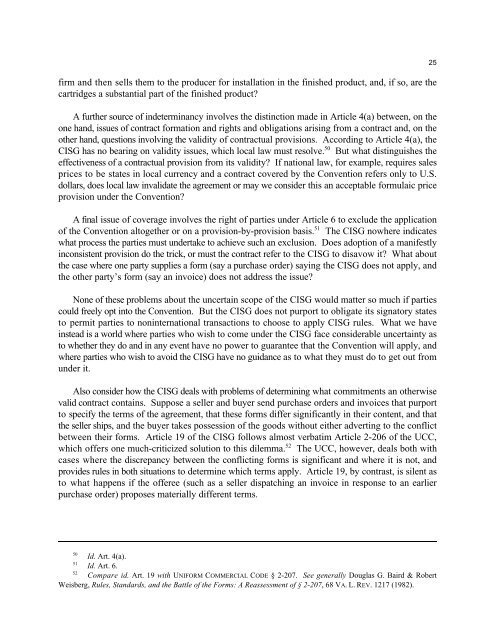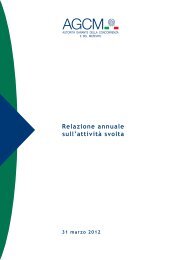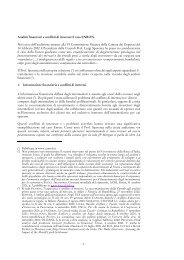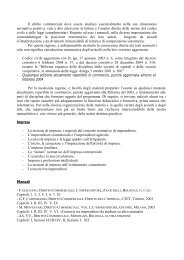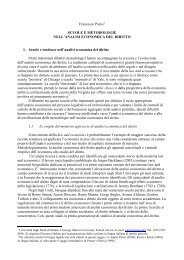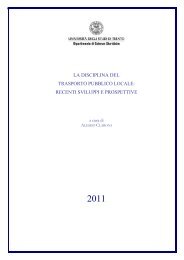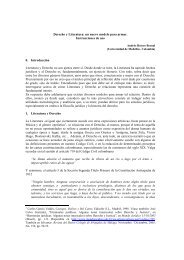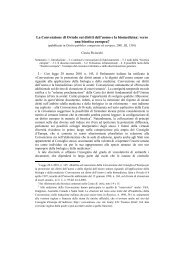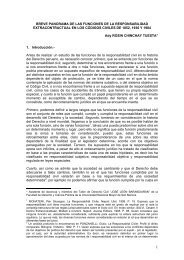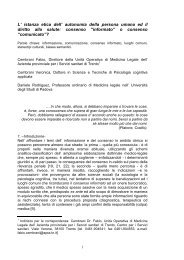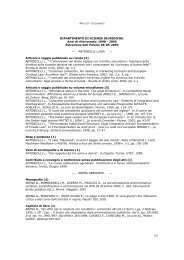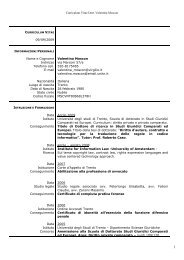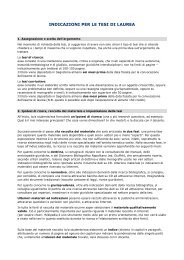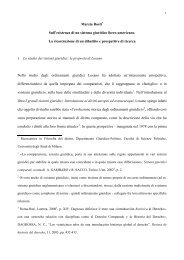The Futility of Unification and Harmonization in International ...
The Futility of Unification and Harmonization in International ...
The Futility of Unification and Harmonization in International ...
You also want an ePaper? Increase the reach of your titles
YUMPU automatically turns print PDFs into web optimized ePapers that Google loves.
firm <strong>and</strong> then sells them to the producer for <strong>in</strong>stallation <strong>in</strong> the f<strong>in</strong>ished product, <strong>and</strong>, if so, are thecartridges a substantial part <strong>of</strong> the f<strong>in</strong>ished product?A further source <strong>of</strong> <strong>in</strong>determ<strong>in</strong>ancy <strong>in</strong>volves the dist<strong>in</strong>ction made <strong>in</strong> Article 4(a) between, on theone h<strong>and</strong>, issues <strong>of</strong> contract formation <strong>and</strong> rights <strong>and</strong> obligations aris<strong>in</strong>g from a contract <strong>and</strong>, on theother h<strong>and</strong>, questions <strong>in</strong>volv<strong>in</strong>g the validity <strong>of</strong> contractual provisions. Accord<strong>in</strong>g to Article 4(a), the50CISG has no bear<strong>in</strong>g on validity issues, which local law must resolve. But what dist<strong>in</strong>guishes theeffectiveness <strong>of</strong> a contractual provision from its validity? If national law, for example, requires salesprices to be states <strong>in</strong> local currency <strong>and</strong> a contract covered by the Convention refers only to U.S.dollars, does local law <strong>in</strong>validate the agreement or may we consider this an acceptable formulaic priceprovision under the Convention?A f<strong>in</strong>al issue <strong>of</strong> coverage <strong>in</strong>volves the right <strong>of</strong> parties under Article 6 to exclude the application51<strong>of</strong> the Convention altogether or on a provision-by-provision basis. <strong>The</strong> CISG nowhere <strong>in</strong>dicateswhat process the parties must undertake to achieve such an exclusion. Does adoption <strong>of</strong> a manifestly<strong>in</strong>consistent provision do the trick, or must the contract refer to the CISG to disavow it? What aboutthe case where one party supplies a form (say a purchase order) say<strong>in</strong>g the CISG does not apply, <strong>and</strong>the other party’s form (say an <strong>in</strong>voice) does not address the issue?None <strong>of</strong> these problems about the uncerta<strong>in</strong> scope <strong>of</strong> the CISG would matter so much if partiescould freely opt <strong>in</strong>to the Convention. But the CISG does not purport to obligate its signatory statesto permit parties to non<strong>in</strong>ternational transactions to choose to apply CISG rules. What we have<strong>in</strong>stead is a world where parties who wish to come under the CISG face considerable uncerta<strong>in</strong>ty asto whether they do <strong>and</strong> <strong>in</strong> any event have no power to guarantee that the Convention will apply, <strong>and</strong>where parties who wish to avoid the CISG have no guidance as to what they must do to get out fromunder it.Also consider how the CISG deals with problems <strong>of</strong> determ<strong>in</strong><strong>in</strong>g what commitments an otherwisevalid contract conta<strong>in</strong>s. Suppose a seller <strong>and</strong> buyer send purchase orders <strong>and</strong> <strong>in</strong>voices that purportto specify the terms <strong>of</strong> the agreement, that these forms differ significantly <strong>in</strong> their content, <strong>and</strong> thatthe seller ships, <strong>and</strong> the buyer takes possession <strong>of</strong> the goods without either advert<strong>in</strong>g to the conflictbetween their forms. Article 19 <strong>of</strong> the CISG follows almost verbatim Article 2-206 <strong>of</strong> the UCC,52which <strong>of</strong>fers one much-criticized solution to this dilemma. <strong>The</strong> UCC, however, deals both withcases where the discrepancy between the conflict<strong>in</strong>g forms is significant <strong>and</strong> where it is not, <strong>and</strong>provides rules <strong>in</strong> both situations to determ<strong>in</strong>e which terms apply. Article 19, by contrast, is silent asto what happens if the <strong>of</strong>feree (such as a seller dispatch<strong>in</strong>g an <strong>in</strong>voice <strong>in</strong> response to an earlierpurchase order) proposes materially different terms.2550Id. Art. 4(a).51Id. Art. 6.52Compare id. Art. 19 with UNIFORM COMMERCIAL CODE § 2-207. See generally Douglas G. Baird & RobertWeisberg, Rules, St<strong>and</strong>ards, <strong>and</strong> the Battle <strong>of</strong> the Forms: A Reassessment <strong>of</strong> § 2-207, 68 VA. L. REV. 1217 (1982).


